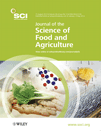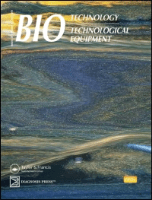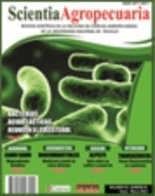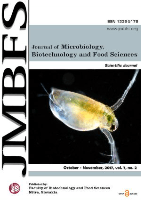
Biotecnia
Scope & Guideline
Fostering collaboration for groundbreaking biotechnological discoveries.
Introduction
Aims and Scopes
- Biotechnology in Agriculture:
Research exploring the use of biotechnological techniques to enhance crop yield, pest resistance, and soil health, including studies on microbial biostimulants and genetic diversity in crops. - Food Science and Technology:
Investigations into the physicochemical properties, nutritional value, and safety of food products, including the development of functional foods and the application of various preservation techniques. - Environmental Biotechnology:
Studies focusing on bioremediation, waste management, and the use of microorganisms to improve environmental health, including wastewater treatment and pollution control. - Health and Medical Biotechnology:
Research addressing the role of biotechnological applications in health, including studies on antimicrobial resistance, nutritional interventions, and the development of diagnostic tools. - Ethics and Policy in Biotechnology:
Discussions around ethical considerations and regulatory frameworks surrounding biotechnological research and its applications, particularly in health and environmental contexts.
Trending and Emerging
- Sustainable Biotechnology Solutions:
There is a growing trend towards research that emphasizes sustainability, such as the use of bioproducts and bioprocesses that minimize environmental impact and promote ecological balance. - Functional Foods and Nutraceuticals:
Increasing focus on the development of foods with health benefits beyond basic nutrition, including studies on bioactive compounds and their effects on health, reflecting consumer interest in health-oriented food products. - Biotechnological Approaches to Climate Change:
Emerging research is addressing the impacts of climate change on agriculture and food security, with studies investigating biotechnological strategies to enhance resilience and adaptation in crops. - Interdisciplinary Research:
There is a trend towards interdisciplinary studies that combine biotechnology with fields such as materials science, medicine, and environmental science, fostering innovative solutions to complex challenges. - Ethical and Regulatory Frameworks in Biotechnology:
An increasing emphasis on the ethical implications and regulatory challenges of biotechnological advancements, reflecting a growing awareness of the societal impacts of biotechnology.
Declining or Waning
- Traditional Agricultural Practices:
There is a waning interest in studies solely focused on conventional agricultural practices without biotechnological enhancements, as researchers are increasingly exploring innovative and sustainable methods. - Non-biotechnological Food Preservation Methods:
As the field of food science advances, there is less emphasis on traditional food preservation techniques that do not utilize biotechnological innovations, with a shift towards methods that enhance food safety and nutritional quality. - Basic Microbiological Studies:
Research that focuses on basic microbiological principles without direct applications in biotechnology or health is becoming less prevalent, as the journal favors studies with applied or translational outcomes.
Similar Journals

JOURNAL OF THE SCIENCE OF FOOD AND AGRICULTURE
Elevating the science of food and agriculture.Welcome to the Journal of the Science of Food and Agriculture, a leading academic publication in the realms of Agronomy, Food Science, Biotechnology, and Nutrition. Founded in 1950 and published by Wiley, this journal has established itself as a vital resource for researchers and professionals committed to advancing knowledge and innovation in food and agricultural sciences. With a remarkable impact factor reflective of its esteemed status—ranking Q1 in Agronomy and Food Science and Q2 in Biotechnology and Nutrition, this journal stands at the forefront of critical research, featuring rigorous peer-reviewed articles that span a wide array of topics. Access options are available through institutional subscriptions, ensuring that indispensable research reaches both scholars and practitioners alike. As it converges into 2024, the journal continues to address key challenges and opportunities within the field, making it essential reading for anyone interested in sustainable agricultural practices and food security. Engage with cutting-edge research that shapes our understanding of food systems and agricultural advancements.

BIOTECHNOLOGY & BIOTECHNOLOGICAL EQUIPMENT
Fostering Collaboration in Biotechnological AdvancementsBIOTECHNOLOGY & BIOTECHNOLOGICAL EQUIPMENT is a leading open access journal published by TAYLOR & FRANCIS LTD from the United Kingdom, dedicated to advancing the field of biotechnology since its inception in 1990. Committed to disseminating high-quality research, the journal has transitioned to open access since 2014, enhancing its accessibility for researchers, professionals, and students alike. With a notable impact in the field, it is categorized in the Q3 quartile for Biotechnology as of 2023 and ranks #193 out of 311 in the Scopus categories for Biochemistry, Genetics, and Molecular Biology. The journal aims to cover a diverse range of topics related to both biotechnological advancements and the equipment that supports them, thus fostering innovative research and practical applications in the biotechnology sector. With an evolving scope that reflects the dynamic nature of biological research, BIOTECHNOLOGY & BIOTECHNOLOGICAL EQUIPMENT plays a crucial role in bridging the gap between laboratory studies and real-world applications, making it an essential resource for anyone involved in biotechnology research.

Biocatalysis and Agricultural Biotechnology
Bridging Biotechnology and Agronomy for Global ImpactBiocatalysis and Agricultural Biotechnology, published by Elsevier, is a distinguished journal in the fields of agronomy, biotechnology, and applied microbiology. With an E-ISSN of 1878-8181, this journal has an impressive impact factor and consistently ranks in the top quadrants of Scopus, notably Q1 in Agronomy and Crop Science and Q2 in several related categories. Since its inception in 2012, it aims to bridge the gap between biocatalysis applications and agricultural practices, fostering innovative research that advances sustainable agriculture and biotechnological applications. The journal is highly regarded, with a Scopus rank of #47 out of 406 in Agronomy and Crop Science, exemplifying its significance in the academic community. As an essential resource for researchers, professionals, and students, it provides a platform for sharing cutting-edge findings that address crucial global challenges in food security, environmental sustainability, and biotechnological advancements. Located in Amsterdam, Netherlands, the journal continues to contribute to the growth and interdisciplinary dialogue in agricultural and biological sciences.

Scientia Agropecuaria
Championing the science of agriculture for a better tomorrow.Scientia Agropecuaria, an esteemed journal published by the Universidad Nacional de Trujillo’s Faculty of Agricultural Sciences, is dedicated to advancing research in the fields of Agronomy, Animal Science, and Soil Science. With a rich heritage since its inception, the journal has embraced Open Access since 2010, ensuring global dissemination of knowledge to researchers and practitioners. Hailing from Trujillo, Peru, it plays a vital role in the scientific community, capturing a Q3 ranking across multiple categories in the 2023 category quartiles, which reflects its growing influence, supported by its commendable Scopus percentile rankings. The scope of the journal is to publish original research, reviews, and insights that address critical issues and innovations in agriculture and related fields, making it a key resource for researchers, professionals, and students aiming to stay abreast of cutting-edge developments. As the journal continues its convergence until 2024, it remains an important platform for impactful contributions to the agricultural sciences.

Emirates Journal of Food and Agriculture
Advancing knowledge in food and agriculture.Emirates Journal of Food and Agriculture is a pivotal publication dedicated to the fields of agronomy, animal sciences, applied microbiology, and food science. Published by the prestigious United Arab Emirates University, this journal serves as a vital platform for disseminating high-quality research and innovative findings within these essential domains. With an ISSN of 2079-052X and an E-ISSN of 2079-0538, the journal has been operational since 1996 and continues to thrive as it converges towards 2024. Holding a notable position in the academic landscape, it is ranked in the Q3 quartile across various categories including Agronomy and Crop Science, Animal Science and Zoology, Applied Microbiology and Biotechnology, and Food Science. Additionally, its Scopus rankings reflect its contribution to advancing knowledge in Agricultural and Biological Sciences, showcasing its competitive standing. The open-access policy fosters wider dissemination of research, making it accessible to a diverse audience. By providing a forum for groundbreaking research and discussions, the Emirates Journal of Food and Agriculture is essential for researchers, professionals, and students eager to engage with contemporary issues and developments within these critical fields.

Izvestiya Vuzov-Prikladnaya Khimiya i Biotekhnologiya
Bridging Knowledge Gaps in Chemistry and BiotechnologyIzvestiya Vuzov-Prikladnaya Khimiya i Biotekhnologiya, published by Irkutsk National Research Technical University, is a prominent open-access journal dedicated to advancing the fields of applied chemistry and biotechnology. Since its inception in 2011, this journal has provided a platform for the dissemination of significant research findings, innovative techniques, and technological advancements that bridge the gap between theoretical frameworks and practical applications. The journal is indexed in various databases, ensuring that published works reach a global audience of researchers, professionals, and students eager to explore the latest developments in these critical disciplines. With its commitment to open-access publishing, Izvestiya Vuzov-Prikladnaya Khimiya i Biotekhnologiya plays a vital role in fostering collaboration and knowledge sharing within the scientific community, thus contributing to the advancement of both fields in a rapidly evolving technological landscape.

Poljoprivreda
Empowering agronomy through open access research.Poljoprivreda is a distinguished open-access journal dedicated to the field of agronomy and crop science, published by the FAC Agriculture Osijek in Croatia. Since its inception in 2000, the journal has been committed to disseminating high-quality research that informs both academic and practical advancements in agriculture. With an ISSN of 1330-7142 and an E-ISSN of 1848-8080, Poljoprivreda provides a vital platform for researchers, professionals, and students to engage with the latest findings and methodologies in agronomy, contributing significantly to the enhancement of agricultural practices in Croatia and beyond. Although currently ranked in the 22nd percentile within its category according to Scopus, the journal aspires to elevate its standing by welcoming innovative research that addresses contemporary challenges within the agricultural sciences. By fostering open access since 2000, Poljoprivreda ensures that its scholarly content is freely available, promoting wider dissemination and collaborative opportunities among researchers globally.

Journal of Microbiology Biotechnology and Food Sciences
Exploring the synergy of microbes, biotechnology, and food sciences.Journal of Microbiology Biotechnology and Food Sciences, published by SLOVAK UNIV AGRICULTURE NITRA, is a distinguished open-access journal dedicated to advancing scholarship in the interrelated fields of microbiology, biotechnology, and food sciences. With an ISSN of 1338-5178, this journal has been accessible to researchers worldwide since 2011, providing a platform for innovative studies that contribute to the understanding of microbial processes, biotechnological advancements, and food science applications. As reflected in its 2023 category quartiles, the journal holds notable positions in Biotechnology (Q3) and Food Science (Q3), and while it ranks in the lower quartiles for Microbiology (Q4) and Molecular Biology (Q4), it is committed to enhancing its impact within these domains. The journal encourages the submission of high-quality research articles, reviews, and short communications that address critical issues in these fields, making it an essential resource for academics, industry professionals, and students alike. Emphasizing both foundational research and practical applications, the Journal of Microbiology Biotechnology and Food Sciences stands as a vital contributor to the scientific discourse, fostering innovation and collaboration among researchers aiming to solve pressing challenges in food safety, biotechnology development, and microbial studies.

BioTech is a forward-thinking academic journal published by MDPI, specializing in the dynamic fields of applied microbiology, biotechnology, biochemistry, bioengineering, and biomedical engineering. Established for promoting impactful research from 2021 to 2024, this journal aims to bridge the gap between laboratory findings and practical applications, serving as a vital resource for researchers, practitioners, and students alike. With its Open Access model, BioTech ensures that groundbreaking innovations are freely available to the global community, fostering collaboration and knowledge transfer across disciplines. In the 2023 rankings, BioTech holds a strong position in Q2 and Q3 quartiles across various categories, reflecting its commitment to high-quality research output. Being indexed in renowned databases, the journal enhances its visibility and reach, making it a preferred platform for sharing transformative ideas and discoveries in biotechnology and related domains. Set against the backdrop of Switzerland’s thriving research environment, BioTech is poised to become an essential resource in the rapidly evolving landscape of life sciences.

APPLIED AND ENVIRONMENTAL MICROBIOLOGY
Exploring Microbial Innovations for a Sustainable FutureApplied and Environmental Microbiology, published by the American Society for Microbiology, stands as a leading journal in the fields of applied microbiology and environmental science since its inception in 1976. With a prestigious Q1 quartile ranking across multiple categories including Applied Microbiology and Biotechnology, Ecology, and Food Science, this journal consistently disseminates high-impact research that drives innovation and advances our understanding of microbial interactions within our ecosystems and industries. As ranked by Scopus, it exhibits prominent rankings in various related fields, underscoring its critical role in shaping contemporary microbiological research. Researchers, professionals, and students alike can stay abreast of groundbreaking studies while contributing to a vast body of knowledge that spans diverse aspects of microbiology, biotechnology, and ecology, ultimately contributing to sustainable practices. Join the community of dedicated scholars and explore vital research findings that impact both environmental health and technological advancement.